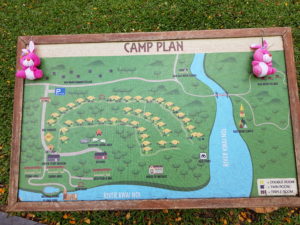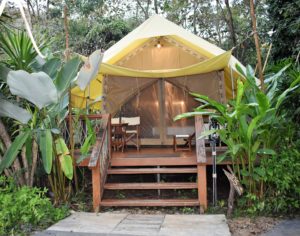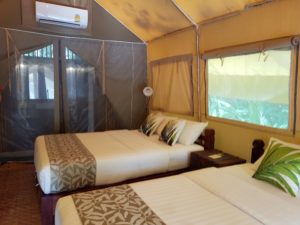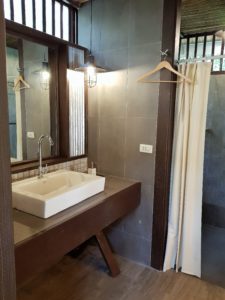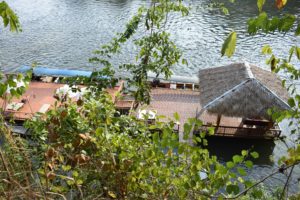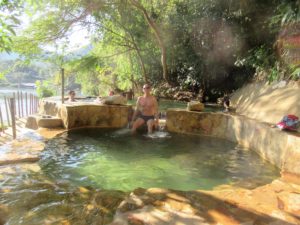“Hintok River Camp”:https://www.hintokrivercamp.com/, perched on a cliff high above Thailand’s River Kwai, was our home for three nights. It is around an hour from Kanchanaburi by road, and located down a 4km narrow, downhill track and only 15-minutes from the notorious Hellfire Pass.
From July to September 1943, Hintok was a British Prisoner of War camp for 300 prisoners, of which 79 died. The current camp pays homage to its predecessor in name and theme with tents reminiscent of the POW bell tents, motifs such as railway ties and a guard tower at the entrance.
We were welcomed with betel nut juice before being shown to our tent (105). The 35+ tents (either triple or double), were centred around a large grassy area, and ours was on the front row. Although the tents were relatively close to each other, tall plants provided a degree of privacy. The paths linking the tents with the communal areas, used paving slabs or railway sleepers which were easy to walk on even in the dark.
Our tent, on a raised wooden deck, had a large covered veranda with two director-style chairs, table and a low traditional deck chair and foot stool. This is glamping at its best and we had 24-hour power and air conditioning, mini bar with complimentary water and tea and coffee making facilities. The only thing missing was a safe although the tents had zips which could be padlocked but this meant bending down each time you went in and out. Inside there was plenty of open plan hanging and storage space, a long table and the comfortable bed was not too low.
The bathroom, at the back of the tent, had a central wash basin with shower at one side and loo at the other (both had shower curtains for privacy). The water in the shower was hot and relatively powerful, unlike that in the basin which once we’d got the plug in, couldn’t be removed so we had to wait for the water to slowly seep away. Soap and shower gel, in eco-friendly containers, were provided and there was a good hairdryer and mirror.
Our first night was New Year’s Eve and the al fresco, cowboy-themed buffet dinner started at what we thought was the early time of 6.45pm. The area was adorned with fairy lights and tee pees, bales of straw and cooking fires had been erected and there was a roaring central fire. A temporary bar had been set up and a bottle of Chilean Sauvignon Blanc was a reasonable 807 Baht (£20). Live cooking stations had lots of choice with spring rolls, soups, hand-made salads, kebabs etc and silver tureens contained stir-fried dishes and Thai curries. The eclectic music was ramped up and the young staff in their checked shirts and jeans danced energetically, encouraging audience participation and amusing the children.
At 9.30pm we were served home-brewed hooch in small bamboo cups and at 10pm, staff and guests released 50 large white paper balloons into the dark night sky. We were in bed by 10.45pm and although the music from both the camp and nearby village continued, it didn’t bother us. We woke at midnight to the sound of fireworks in the distance but didn’t stir.
Dinner on subsequent nights were slimmed down affairs, but equally good.
Breakfast was served in a large, open, decked area, which had simple wooden furniture and overlooked the river. There was fruit, yoghurt, cereals, orange juice, breads, salads and a hot selection of bacon, sausages, fried rice, a pork soup, pasta dish and an egg chef.
One of the attractions were two natural pools, down 60 steep steps. These are filled by a stream flowing into them with the water then flowing into the Kwai. The pools, with their refreshing water, took a little getting in and out. The larger pool had lovely natural shade and was about 3.5 foot deep, with the smaller one being slightly shallower. Two floating pontoons had a few loungers for sunbathing.
Bikes were available and in the massage area, a one-hour Thai massage was a very reasonable 400 Baht (£10).
Whilst there are no mosquitoes, insect repellent is advised.
The camp has a small museum on the site of the former POW kitchen. It detailed the history of the camp and displayed pottery pieces excavated whilst looking for the POW graves. An evocative poem, by John Wisecup, an American POW, summed up the hell the prisoners endured:
Hin Tok camp! Filth ridden hole!
Our tents and beds were rotten.
The lice and rain destroyed our soul
Men died forlorn, forgotten.
No pest house from a bygone age
Could match its stench and squalor.
The jungle held us like a cage
And only death could follow.
Mosquitoes, lice and flies did vex
The starving, sick and dying.
This palsied lot of festering wrecks,
Soon failed . . . long past trying.
Cholera came and took its toll,
We dug the graves ‘til midnight.
That mighty railroad had to run
We toiled at night by torchlight.
